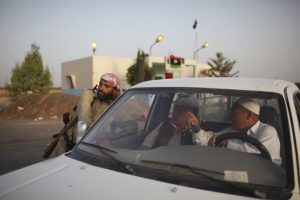TARHOUNA, Libya (AP) — Rebel reinforcements arrived outside one of Moammar Gadhafi’s last strongholds in Libya on Monday, even as the forces arrayed against the toppled dictator gave the town

a chance to surrender and avoid a fight.
Thousands of rebels have converged on Bani Walid, a desert town some 90 miles (140 kilometers) southeast of Tripoli. Gadhafi has been on the run since losing his capital last month.
Rebel forces control most of Libya and are setting up a new government. They can’t declare total victory, however, until Gadhafi is caught and areas like Bani Walid are subdued, so they have shown they are willing to be patient, perhaps hoping to avoid a bitter inter-clan fight that could create lasting divisions.
The rebels have extended to Saturday a deadline for the surrender of Gadhafi’s hometown of Sirte and other loyalist areas, but some have warned they could attack Bani Walid sooner because many prominent former regime officials were believed to be inside.
The scene was calm early Monday, with rebels brewing tea and lighting morning cigarettes, at a checkpoint about 40 miles (70 kilometers) from Bani Walid’s center. Then a convoy of nine trucks flying the independence-era tricolor the rebels have adopted arrived. As his men fired rifles into the air and shouted “God is great!” commander Ismail al-Gitani said they were part of a larger force and that he was ordered to reinforce the northern approaches to Bani Walid.
He refused to say how many fighters he had brought.
“We won’t go inside Bani Walid unless the Warfala tribe invites us,” he said, referring to Bani Walid’s main tribe. “The Warfala have to lead us into Bani Walid. Hopefully no one will be shot. We don’t want to use our weapons. But if the Gadhafi loyalists shoot at us, of course we will return fire.”
The Warfala are believed to be about 1-million-strong, one-sixth of Libya’s population.
Rebel commanders have said the door was still open for more talks about a surrender, but rebel negotiator Abdullah Kanshil said Monday that “there are no negotiations.” He added that rebels were talking to individual families in the town about urgent needs for water and food.
The talks broke down, in part, because the loyalists insisted the rebels disarm before entering the town.
The rebels have said the hard-core loyalists are a small minority inside the town, but are heavily armed and stoking fear to keep other residents from surrendering, telling residents the rebels will rape their wives and daughters.
“We know (the loyalists) are trying very hard to avert Bani Walid’s surrender,” said Jalal el-Gallal, a spokesman for Libya’s opposition council.
The rebels also say Gadhafi has some genuine supporters in Bani Walid, mainly people linked to the dictator through an elaborate patronage system that helped keep him in power for nearly 42 years.
Some of the rebels on the outskirts of Bani Walid have more reason than most to be impatient. Abdel-Basit bin Balla, a 31-year-old businessman, said he was arrested in Bani Walid during anti-Gadhafi protests in his hometown in May. He was taken to Tripoli’s Abu Salim prison, infamous as a detention center for political dissidents.
Bin Balla was freed when rebels took Tripoli, and has joined their forces, though he did not look much like a fighter in his sweat pants and plastic sandals.
“I want to enter Bani Walid with the rebel flag in my hand,” he said.
While it is now held by loyalists, Bani Walid also has a history of opposition to Gadhafi. Western diplomats in Libya and opposition leaders abroad reported in 1993 that the air force had put down an uprising by army units in Misrata and Bani Walid. They said many officers were executed and arrested.
NATO, meanwhile, reported bombing several targets near Sirte and other areas overnight.
NATO has been bombing Gadhafi’s forces since March under a United Nations mandate to protect Libyan civilians. But that mandate expires Sept. 27, and the rebels may be eager to end the fight before it runs out — since it may be politically difficult to get it renewed.
In Tripoli, el-Gallal said Libya’s transition to democratic rule would begin with a “declaration of liberation,” starting the countdown on an eight-month deadline for Libya’s transitional council to arrange elections for a national assembly.
“When the clock starts ticking on those eight months remains to be seen,” said el-Gallal. He said it wasn’t yet clear what defined liberation — whether it was when the rebels control the entire country, or the arrest of Gadhafi.
Ian Martin, a U.N. special adviser on Libya, said the United Nations was ready to help with Libya’s next elections, but that there would be immense hurdles in its democratic transition.
“How can there not be challenges in a country where there is virtually no living memory of an election?” he asked reporters in Tripoli.







